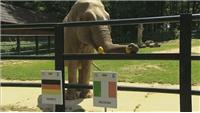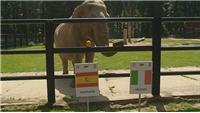
As Greece's Group A reckoning approaches, Vassiliki Papantonopoulou singles out the archetypal Greek soldier whose example can inspire them to victory against Russia.
Twenty years ago, a lad of 15, wore the Greece national jersey for the first time as a member of the Under-17 team. He has gone on to play a total of 111 matches for the Greek under-age selections and 119 for the senior side.
He scored twice in a 5-0 win against a Netherlands side that featured Mark van Bommel, Boudewijn Zenden and Wilfred Bouma to get third place in the 1995 UEFA European Under-18 Championship.

Who is this Greek hero?
Three years later, in 1998, he scored the winner against Michael Ballack's Germany in the semi-final, and captained his team to the final of the UEFA European U21 Championship, which Greece lost to Guti's Spain.
Six years later in Porto, he scored the first goal in Greece's 2-1 opening night win against Portugal, setting the tone en route to his nation's finest sporting achievement to-date, winning UEFA EURO 2004.
On Saturday night, he will once again wear national team kit and the captain's armband, and will lead his team-mates at the National Stadium Warsaw in a win-or-bust match against Russia, that will determine Greece's UEFA EURO 2012 fate. In the toughest and most significant match his side have played in two years, he will equal the Greek record of 120 caps set by another great captain, Theodoros Zagorakis.
Giorgos Karagounis – for it is he – is a unique figure in Greek football. He has never made magazine covers, and does not possess the face or the body that tend to attract attention. Yet this archetypal Greek soldier is in a league of his own. What makes him stand out? To borrow the words of fellow UEFA EURO 2004 winner Panagiotis Fyssas: "His passion, energy and will to win every match. He never thinks his time has passed and that he has given all he could possibly give to the team. He never feels finished. He could go on playing for another 200 years."
This passion that Karagounis brings onto the pitch is what Greece will need – and they need all 11 players on the pitch to show it. They also need his footballing brain, his ability to hold the ball and buy time – also multiplied by 11. For this will be more than a game of lungs and legs. Greece will need to bring their minds and souls into the match, just like their oldest teenager, their captain, has done all his life.
- Arbeloa: Spain must never change their style
- Wedding bells turn Iniesta's legs to jelly
- Pele: Brazil's 1970 World Cup winners better than Spain
- Pirlo: Only Spain are superior to Italy
- Spain disproved boring tag with empathic final win, insists Alonso
- Fernando Torres revels in Euro 2012 crown
- Italy can reach the final at World Cup 2014
- Johan Cruyff: I enjoyed Italy and I'm a big fan of Del Bosque's Spain
- De Gea & Mata named in Olympics squad
- Shevchenko: Euro 2012 was a success for Ukraine
Hot News
- Funny Balotelli!
- Spanish fans celebrate Euro Cup win
- That's German WAGS!
- The sexy female fans in Euro 2012
- Euro 2012: Spain fans celebrate victory
- Spain vs Italy in clash of the Euro WAGs
- Euro 2012 Final - Spain 4 : 0 Italy, Part 2
- Germany knocked out by Italy
- Natalia Siwiec blasts Sol and the BBC
- Coleen Rooney reveals her bikini body secrets
- Italy's fans celebrated wildly
- Euro 2012 Final - Spain 4 : 0 Italy, Part 1
| Rank | Team | W/D/L | Pts |
|---|
Cities & Stadiums
The Top 3 Teams of Previous Tournaments
| Year | Winners | Runner-up | Third place |
|---|---|---|---|
| 2008 | Spain | Germany | Russia / Turkey |
| 2004 | Greece | Portugal | Netherlands / Czech Republic |
| 2000 | France | Italy | Netherlands / Portugal |
| 1996 | Germany | Czech Republic | France / England |
| 1992 | Denmark | Germany | Netherlands / Sweden |
| 1988 | Netherlands | Soviet Union | Italy / West Germany |
| 1984 | France | Spain | Denmark / Portugal |
| 1980 | West Germany | Belgium | Czechoslovakia |
| 1976 | Czechoslovakia | West Germany | Netherlands |
| 1972 | West Germany | Soviet Union | Belgium |
| 1968 | Italy | Yugoslavia | England |
| 1964 | Spain | Soviet Union | Hungary |
| 1960 | Soviet Union | Yugoslavia | Czechoslovakia |




